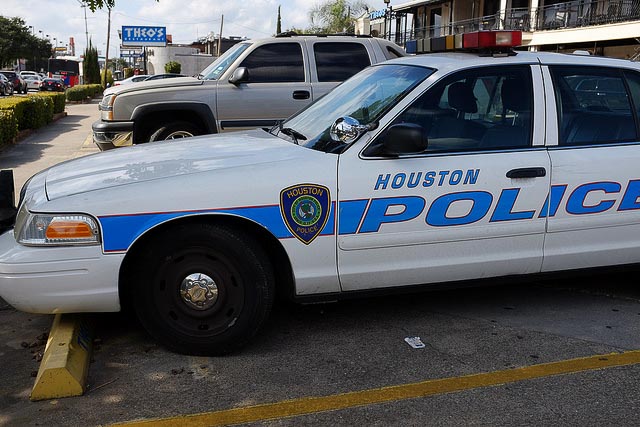This post is part of the Urban Edge blog's in-depth coverage of the 2017 Kinder Houston Area Survey.
Houston has its fair share of challenges. The economy isn’t as strong as it’s been in recent years. Affordable housing near jobs is inaccessible for many residents. And traffic is an ever-present nightmare.
But one thing most residents aren’t so worried about is crime.
The Kinder Houston Area Survey asks residents about crime and safety in lots of different ways. And by every measure, Houstonians appear to feel safer than they have before.
For example, every year, the survey asks residents to name the biggest problem facing the region. In 2017, just 15 percent of residents mentioned crime, one of the lowest rates they’ve given since the survey launched in the 1980s. That’s down from 21 percent just a year ago. Article continues below graph.
Those attitudes can be studied in other ways, too. Just 18 percent of residents say they’re “very worried” about themselves or a family member becoming the victim of a violent crime – the lowest number since the question was first asked in 1995. Back then, 43 percent of respondents said they were “very worried” – a dramatic shift.
And almost 92 percent of residents say they feel “very” or “somewhat” safe in their neighborhood, according to the results of the 2017 Kinder Houston Area Survey. Article continues below chart.
“All the measures point to a lessening fear of crime,” said Stephen Klineberg, founding director of the Kinder Institute for Urban Research, which leads the survey. “There’s a growing feeling of comfort with personal safety and a sense that things are better in the streets of Houston than they used to be.”
(Notably, however, not everyone in Houston feels overwhelming safe. Only 69 percent of Houstonians earning $12,500 to $25,000 per year said they feel safe in their neighborhoods. More than 1 in 4 of them said they don’t.)
The declining concern with crime mirrors national and local crime trends. Violent crime rates have fallen in Houston, and across the country, since the mid-1990s. In 2015, for example, the violent crime rate in Houston was about 40 percent below what it was in 1991, based on Houston Police Department data reported to the FBI.
This year, the Kinder Institute asked a new question about policing in consultation with the Houston Police Department. It asked residents whether they agree or disagree that, “If I needed assistance from the police, I would feel comfortable calling them for help.”
The question comes amid several high-profile examples across the country of police violence towards unarmed civilians, and in particular, fatal shootings of African-Americans. In 2015, the Houston area found itself at the center of that discussion when state troopers arrested Sandra Bland following a traffic stop northwest of here, and she was found hanged in a Waller County jail just a few days later.
Overall, Houstonians appear relatively comfortable asking police for help. About 87 percent of respondents said they “strongly” or “slightly” agreed that they’d feel comfortable calling the cops. But 12 percent of respondents indicated they disagreed, representing a significant portion of the region. Article continues below chart.
While 94 percent of U.S.-born Anglos feel comfortable asking police for assistance, just 72 percent of U.S.-born black people do.
Hispanic people, meanwhile, appear to be relatively trusting of the police. About 77 percent of U.S. -born Hispanics said they’d feel comfortable calling the police, as did 93 percent of Hispanic immigrants, giving no signs (as of yet) of a growing mistrust of the police in immigrant communities.
Larry Yium, deputy director of planning at the Houston Police Department, said the department requested the question in order to get an honest assessment of whether the agency is meeting the public’s expectations.
“We believe we need to know what’s really happening out there,” he said. “What people believe, whether it’s right or wrong, is reality.”
He said the department is pleased that nearly 90 percent of respondents feel comfortable calling the cops for help, but that the number could be even better. He also said the racial disparities in responses aren’t necessarily a surprise, but they’re important to acknowledge.
“We feel this is reflective of feelings held nationwide regarding policing, that there’s a disparity,” Yium said.
He said new Houston Police Chief Art Acevedo’s emphasis on relational policing and community policing should help improve trust of police across the board.
“What’s important to people is how they’re treated on the individual basis,” Yium said. “If that person, for whatever reason, needs us, how we treat them as an individual is what really matters.”






